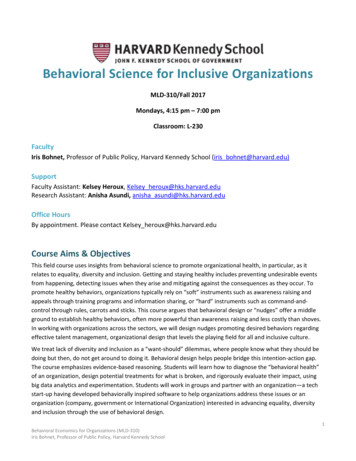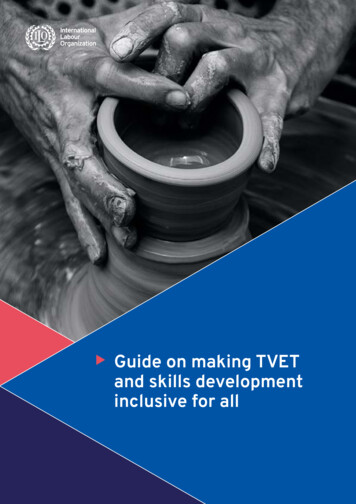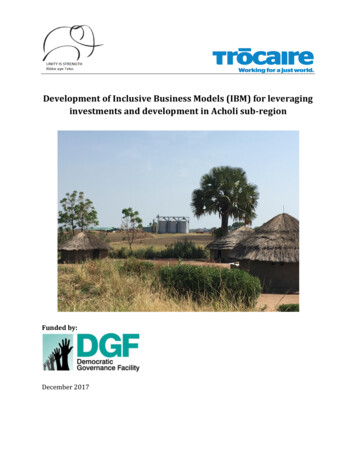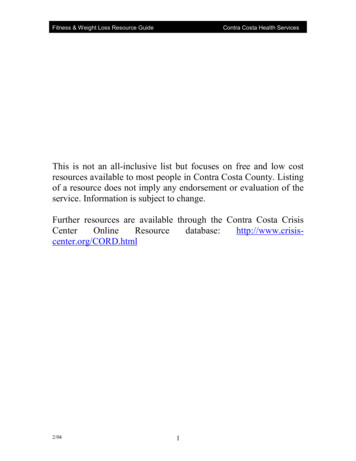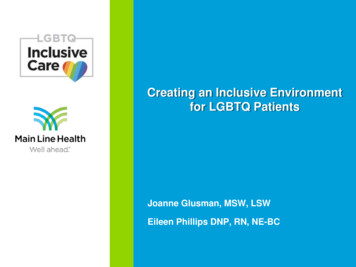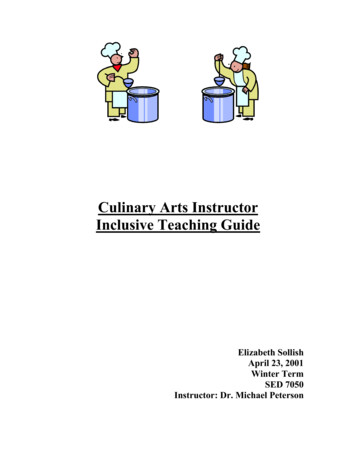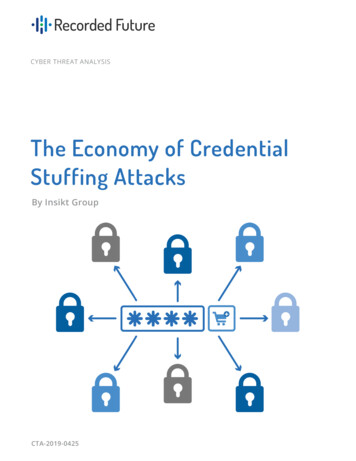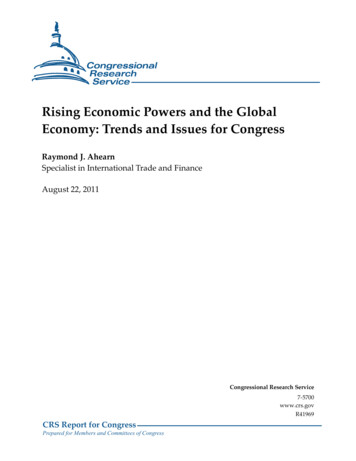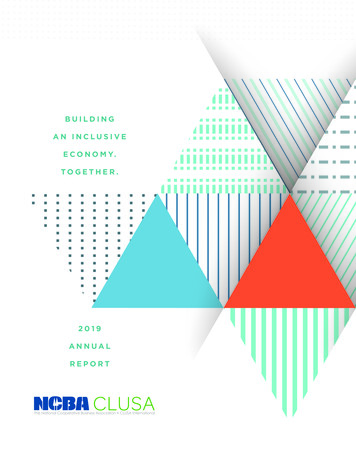
Transcription
BUILDINGAN INCLUSIVEE C O N O M Y.TOGETHER.2019ANNUALREPORTThe National Cooperative Business Association CLUSA International
INTERNATIONAL PROGRAMST H E N AT I O N A L CO O P E R AT I V E B U S I N E S SA S S O C I AT I O N C LU S A I N T E R N AT I O N A LI S T H E P R I M A RY VO I C E I N T H E U N I T E D S TAT E SF O R P E O P L E W H O U S E CO O P E R AT I V E S TOB U I L D A B E T T E R , M O R E I N C LU S I V E WO R L D.MISSIONOur mission is to develop, advance and protect cooperative enterprise.V I S I O N S TAT E M E N TNCBA CLUSA works to build a better world and a more inclusive economythat empowers people to contribute to shared prosperity and wellbeing for themselves and future generations. By leveraging the sharedresources of the cooperative movement, we seek to engage, partner withand empower people from all walks of life—particularly those left behindby a shifting economy and facing the greatest economic and societalbarriers. We achieve this vision through collaborative partnerships indevelopment, advocacy, public awareness and thought leadership.1775 I Street, NW8th FloorWashington, DC 20006ncbaclusa.coop22019 ANNUAL REPORT
BUILDINGAN INCLUSIVEE C O N O M Y.TOGETHER.2019 ANNUAL REPORTCONTENTS2C H A I R M A N A N D C E O M E S S AG E4C O - O P S BY T H E N U M B E R S6MEMBERSHIP82 0 1 9 C O - O P I M PAC T CO N F E R E N C E10A DVO C AC Y12I N T E R N AT I O N A L P R O G R A M S20FINANCIAL22B OA R D M E M B E R S
CHAIRMAN AND CEO MESSAGES TA B I L I T Y A N D S U S TA I N A B I L I T Y O FCO O P E R AT I V E B U S I N E S S E SCo-ops have always been about solutions tochallenges faced by consumers, producers, workersand small businesses. While the external circumstancesmight change, the cooperative solution is constant:cooperatives put the people who use the business at thecenter of who controls and benefits from the business.The power of the cooperative model has stood thetest of time and has been there to help people addresscritical challenges so that more people can build andparticipate in the economy. As the nation and theglobe face the unprecedented challenges related toE R B I N C R OW E L LCHAIRNCBA CLUSAB OA R D O F D I R E C TO R SCOVID-19, we as a cooperative community have theopportunity and responsibility to again stand up andhelp our communities respond to and recover from thisglobal pandemic. Perhaps not since 1945 in the wake ofWorld War II has the need for a cooperative responseto a global crisis been so clear. It is time to act on ourprinciple of concern for community by working together.We have already seen heroic efforts by members ofour cooperative family here in the U.S. to ensure thateveryone has access to critical goods and services. Werecognize and thank the extraordinary people workingin food co-ops, homecare co-ops, rural electric co-ops,agricultural co-ops and beyond who have put their ownhealth at risk to serve their communities. Internationally,we know that co-ops are meeting this moment by usingthe co-op model to further address community needs. Inpartnership with NCBA CLUSA and other stakeholders,co-ops in Kenya are mobilizing in response to COVID-19.NCBA CLUSA’s USAID-funded Cooperative DevelopmentProject in the country has swiftly pivoted to curbingDOUG O’BRIENPRESIDENT & CEONCBA CLUSAthe spread of COVID-19 among its members and theirfamilies. The Lelchego Dairy Cooperative Society hastaken the lead in educating their communities aboutCOVID-19 symptoms, hand-washing techniques, theimportance of social distancing and proper sanitationof the co-op’s milk processing facilities and distribution22019 ANNUAL REPORT
“ W E A R E L E A D I N G CO N V E R S AT I O N S W I T HP O L I C Y M A K E R S A N D OT H E R S O N H OW C O - O P SC A N P L AY A B I G G E R A N D M O R E M E A N I N G F U LPA R T O F T H E E CO N O M I C R E COV E RY.”channels. Back here in the U.S., the Cooperativesuccessful in including cooperatives as eligible entitiesDevelopment Fund has helped gather resources andin the Economic Injury Disaster Loan program and wedistribute them to co-ops recovering from an economichave worked tirelessly to increase eligibility and accessdownturn, as well as from hurricanes, floods and otherfor cooperatives to the Paycheck Protection Programnatural disasters. They also provide funding for educationand other economic assistance tools. As the economicand expanded cooperative development.fallout from the pandemic continues to unfold, we willmaintain this work as our priority. And we are leadingWhile many in the co-op community have steppedconversations with policymakers and others on howforward to meet this moment, we need to do more.co-ops can play a bigger and more meaningful part ofToday in the context of COVID-19, we see newthe economic recovery.challenges, and we also have a clearer picture ofthe fact that too many people in our country lackTo increase our impact and influence of cooperatives,opportunity or are negatively impacted by thewe need to grow our membership — both to ensureinequitable systems we have in place. The results havewe are representative of the cooperative communitybeen devastating both in terms of public health andand so we have the resources to do the work. So lasteconomic turmoil: in many places, the mortality ratesJune, the Board created a Membership Growth Taskrelated to COVID-19 are startlingly higher for people ofForce to ensure that the association will (1) morecolor; workers in lower-income families are more likelyeffectively align, represent and advocate for theto be working in an essential sector, and thus at greaterentire U.S. cooperative community, and (2) grow andrisk of contracting the virus; and people without accessdiversify the association’s resources to ensure long-termto sufficient internet or computers lack the ability tosustainability and accountability to the cooperativeparticipate in critical distance education or telehealth.community. With a focus on reaching these goals, theTask Force is examining NCBA CLUSA’s dues structureAs members of NCBA CLUSA, you know that for yearsthat has not been updated in over 20 years.we have focused on how cooperatives can build a moreinclusive economy. The COVID-19 experience has madeWith a broader membership and more resources,abundantly clear how much these types of strategiesNCBA CLUSA will not only continue, but will expandare needed and just how important it is for cooperativeson its mission to advocate, defend and promote theto play a bigger role in our economy and the lives ofcooperative business model. This mission has nevertheir members. That is why NCBA CLUSA has beenbeen so important as the nation and the world seekfocused on protecting as many co-ops as possible fromways to respond to and ultimately recover from thethe economic consequences of COVID-19 and makingnegative impacts of COVID-19. Thank you for being asure that policymakers and others understand howmember of NCBA CLUSA and for ensuring that co-opscooperatives can provide the longer-term solutions thatare positioned to build a more inclusive economy.are so clearly needed.Our first order of business in the COVID-19 era isto ensure as many cooperatives as possible areeligible for and have access to economic assistanceprograms designed to help businesses. Along withallies throughout the cooperative community, we were2019 ANNUAL REPORT3
CO-OPS BY THE NUMBERS6 5 ,0 0 0CO O P E R AT I V EE N T E R P R I S E S O P E R AT EAC R O S S T H E U . S .1 IN 3AMERICANSARE CO-OP MEMBERSCO - O P S G E N E R AT E 7 5 B I L L I O NI N A N N UA L WAG E S A N D 6 5 0 B I L L I ONIN REVENUEELECTRIC CO-OPS1FOOD CO-OPS2E L E C T R I C CO - O P S P OW E R1 IN 8AMERICANSC U S TO M E R S S U P P O R T185 LOCAL FARMS ANDPRODUCERSW H E N T H E Y S H O P AT T H E I R CO - O PE L E C T R I C C O O P E R AT I V E SA R E E N E R GY P R OV I D E R SAND ENGINES OF ECONOMICG R OW T H F O R42 MILLIONAMERICANS1 OUT OF EVERY 3P R O D U C T S S O L D AT T H E AV E R AG EF O O D CO - O P I SORGANICE L E C T R I C C O O P E R AT I V E SINVEST 12 BILLIONA N N UA L LY I N LO C A LECONOMIES ANDT H E S E C TO R C O N T R I B U T E S 88.4 BILLIONTO T H E U . S . G D P A N N UA L LY1 “The Economic Impact of America’s Electric Cooperatives.” FTI Consulting, March2019, jointly commissioned by NRECA and NRUCFC.42019 ANNUAL REPORT24,100 POUNDSO F H E A LT H Y, E D I B L E F O O D I SD O N AT E D TO F O O D PA N T R I E S BYT H E AV E R AG E F O O D CO - O P2 “You are the Co-op Difference.” ICA Group, 2017, commissioned by National Co opGrocers.
CREDIT UNIONS85,400CREDIT UNIONSWO R L DW I D E S E RV E274 MILLIONMEMBERS3CREDIT UNIONS’INSURANCE FUNDS AREMORE STABLEWORKER CO-OPSPAY A N AV E R AG EH O U R LY WAG E O F 19.677465ANDWO R K E R C O - O P SAROUND THE U.S. WITHA N E S T I M AT E DTO R I S K T H A N B A N K SDURING FINANCIALCRISES5WO R K E R SLESS LIABLE6,454WO R K E R CO - O P SE X I S T I N A VA R I E T Y O FINDUSTRIES INCLUDING52%OF CREDIT UNIONC E O S A R E WO M E N ,10X HIGHERTHAN BANK CEOS4C R E D I T U N I O N S H AV EDOUBLEDSMALL BUSINESSLOA N S OV E R T H E PA S TDECADE6HOUSING CO-OPSCHILD CARE,PROFESSIONALSERVICES,RETAIL, ANDHOME CARET H E WO R K F O R C E ATWO R K E R C O - O P S I S62.5% FEMALEAND35.8% MALEAGRICULTURE CO-OPS CO - O P OW N E DCOMMUNITIES SELLFORMOREANDFASTERTHAN HOMES INCO M M E R C I A L PA R K S 8E M P OW E R E D H O U S I N GCO-OP RESIDENTS AREMORE LIKELYTO B E E N G AG E DCITIZENS9CO - O P CO M M U N I T I E SH AV E I N V E S T E D1.9 MILLION 50 MILLIONFA R M E R M E M B E R S3,000F R O M G R A I N S TODA I RY, M E AT TO F R U I T,V E G E TA B L E S A N DNUTS, AND MUCHMORE, AMERICANSR E LY O N CO - O P S TOH E L P P R OV I D E T H EF O O D W E E AT A N DT H E C LOT H E SWE WEAR. 92 BILLIONI N H E A LT HAND SAFETYI M P R OV E M E N T S S I N C E2 0 0 8 10H O U S I N G CO - O P S I NT H E U . S . P R OV I D E300,000U N I T S O F H O U S I N G 113 World Council of Credit Unions 2017 Statistical Report. September 20184 “CUs Must Continue Investment in Diverse Populations to Succeed.” CUNA NewsRSS, CUNA News, 1 May 20195 “Frequently Requested Credit Union and Bank Comparisons.” Credit UnionNational Association, 2016.6 “Member Business Lending by Credit Unions.” Credit Union National Association, 2013.7 2019 Worker Cooperative State of the Sector Report8 Ward, Sally K, Charlie French and Kelly Giraud. “Ownership in New Hampshire’sVA L U E O F A S S E T SOW N E D BYAG R I C U LT U R E C O - O P S :P R OV I D E300,000 JOBSA N D A TOTA L PAY R O L LO F OV E R 8 BILLION‘Mobile Parks’: A Report on Economic Outcomes,” The Carsey Institute at theUniversity of New Hampshire, March 2010.9 ROC USA, “Sustainably Scaling Resident Ownership: Leadership and Impact,”Strategic Plan: July 2018-June 2021, 201810 ROC USA, “Sustainably Scaling Resident Ownership: Leadership and Impact,”Strategic Plan: July 2018-June 2021, 201811 “Counting Limited Equity Co-ops,” Research Update, Urban Homestead AssistanceBoard (UHAB), February 2016
MEMBERSHIPCLUSA is proud to represent cooperative businesses, providing“ NCBApremier cross-sector collaboration opportunities and amplifying ourmembers’ voices in our work to educate policymakers on cooperativeeconomic impact and influence favorable federal policy.”Our three membership categories—Individual,on how cooperative businesses contribute to diverse,Organization and Associate—represent all sectors ofequitable and inclusive workplaces and communities,the economy, providing an avenue for co-ops and theircreating new opportunities for economic participationsupporters to contribute to a national dialogue andand advancement.influence lasting, transformative change in communitiesnationwide. Membership with NCBA CLUSA alsoA R E S O LU T I O N O N D I V E R S I T Y,connects U.S. cooperatives with a global communityE Q U I T Y A N D I N C LU S I O Nof more than 1.2 billion cooperators through ourmembership and representation in the InternationalAs we enter the new decade, NCBA CLUSA reaffirms itsCooperative Alliance.commitment to championing an inclusive economy. InOctober 2019, with strong support and urging from ourSince 2017, NCBA CLUSA has been guided by the firstmembers, our board of directors adopted a resolutionfour pillars of the inclusive economy: participation,to lift up and advance Diversity, Equity and Inclusiongrowth, stability and sustainability. In 2020, we shift(DEI) within the cooperative identity. NCBA CLUSAour attention to the final pillar—equity—with a focusacted on this resolution at the International CooperativeMEMBERSHIP BREAKDOWN BY SECTORU T I L I T I E S G &T 1 %H E A LT H C A R E 1 %S TAT E C R E D I T U N I O N L E AG U E S 1 %AG R I C U LT U R E 1 %INSURANCE1%BANKING AND FINANCE2%A S S O C I AT E M E M B E R S3%N AT I O N A L A S S O C I AT I O N3%S TAT E R U R A L E L E C T R I C A S S O C I AT I O N S3%WO R K E R3%C R E D I T U N I O N L E AG U E S4%HOUSING4%CREDIT UNIONS5%UTILITIES6%PURCHASING8%CO-OP ASSOCIATIONS, COUNCILS, CENTERS AND INSTITUTIONS 1 3 %I N D I V I D UA L S M E M B E R S 20 %CO N S U M E R 2 3 %62019 ANNUAL REPORT
Alliance’s conference in Kigali, Rwanda later that samemonth, formally requesting that its governing bodyaddress DEI within the context of the cooperativeprinciples. We have also internalized this message byestablishing a DEI working group to help NCBA CLUSAlead in incorporating diversity, equity and inclusion intoits own practices.As we move through 2020, membership in NCBACLUSA will remain crucial, not only in advancinga trusted, proven way to do business and buildcommunities, but also in fully capturing the potential ofthe cooperative moment—our generational opportunityto shape a more inclusive future.MEMBERSHIP BREAKDOWNBY CATEGORYCO O P E R AT I V E B U S I N E S S J O U R N A L3%77%A S S O C I AT ENow in its third year, the Journal made significantstrides in 2019 providing our members with compellingcontent and thought leadership from new writersO R G A N I Z AT I O N A Land contributors in the cooperative community. Our20%I N D I V I D UA Larticles represented a wide spectrum of co-op sectors,including worker, farmer, electric and financial, as wellas several crosscutting pieces (co-ops and the SDGs,the inclusive economy). We also published researchfrom new organizations (Inclusiv, Urban Institute,Capital Impact Partners, Filene Research Institute),educational institutions (Rutgers, Brandeis, Saint Mary’s,University of Maine) and co-op developers (OCDC,CooperationWorks!).NCBA CLUSA looks forward to expanding the contentand reach of this first-class journal. Thank you toour members for sharing your research and insights,ensuring the cooperative community has the benefit ofthe industry’s latest thinking.2019 ANNUAL REPORT7
2019 CO-OP IMPACT CONFERENCE2019 provided an unparalleled platform to reenergize“ IMPACTthe cooperative movement and galvanize its championsaround building the next economy with ‘power in purpose.’”400 AT T E N D E E S40SESSIONS93SPEAKERSThis year’s theme linked four tracks, 40 sessions andprogram with six breakout sessions and two plenaries,93 speakers over the three-day event. It also providedall focused on the stability and sustainability ofan opportunity to broaden the national, cross-sectorthe cooperative model when used in internationalconversation on cooperatives to include co-opdevelopment. Other key programming included thedevelopers, financers, community and city leaders,first Women’s Leadership Breakfast, video messagesinnovators, economists and policymakers.from 18 members of Congress and a dedicated track forIMPACT 2019 also provided a robust internationalpurchasing cooperatives.The keynote address at the IMPACT 2019 Conference by Felicia Wong, President and CEO of the RooseveltInstitute, holds the attention of attendees with its focus on the moral imperative of an inclusive economy.82019 ANNUAL REPORT
“Building an inclusive economy is notjust the right thing to do; it’s the smartthing to do,” Felicia Wong, Presidentand CEO of the Roosevelt Institute,said during her keynote at the 3rdannual Co-op IMPACT Conference.IMPACT 2019 marked the first time NCBA CLUSA offered afull day of international programming, featuring three tracks:Sustainability and Self-Reliance, Stability and Innovations inCo-op Development. Here, Alex Serrano, Senior Vice Presidentof International Development for NCBA CLUSA, and KimberlyRosen, Deputy Assistant Administrator at USAID’s Bureau forEconomic Growth, Education and Environment, discuss how coops can help achieve the UN’s Sustainable Development Goals.IMPACT 2019 marked a key opportunity tobroaden the conversation around co-ops—especially as stakeholder priorities begin to shiftin favor of a more people-centered economy.Bette Brand, Administrator of the U.S. Departmentof Agriculture (USDA)’s Rural Business-CooperativeService, receives NCBA CLUSA’s CooperativeIMPACT Champion Award during a reception hostedby REI Co-op’s Washington, DC Flagship Store.2019 ANNUAL REPORT9
ADVOCACY2019, NCBA CLUSA’s advocacy team helped educate,“ Throughoutdifferentiate and keep cooperative priorities top-of-mind beforepolicymakers and stakeholders—critical work that ensures co-ops arerecognized, supported in the budget and eligible for federal programs.MET WITH MORETHAN100CO N G R E S S I O N A LOFFICESR E E S TA B L I S H E DAND GREWCONGRESSIONALC O O P E R AT I V EB U S I N E S S C AU C U SM E M B E R S H I P BYMORE THAN33%INCREASED FUNDINGF O R T H E U . S . AG E N C YF O R I N T E R N AT I O N A LD E V E LO P M E N T ’ SCO O P E R AT I V ED E V E LO P M E N TP R O G R A M BY42%P R E S E RV E D R U R A LCO O P E R AT I V ED E V E LO P M E N TG R A N T F U N D I N G AT 5.8 MILLIONDESPITE A BUDGETPROPOSALR E CO M M E N D I N G I T SE L I M I N AT I O NA N O P E N L E T T E R TO 2 0 2 0IMPLEMENTING THE MAIN STREETP R E S I D E N T I A L C A N D I DAT E SE M P LOY E E OW N E R S H I P AC TIn an open letter addressed to candidates running inSince the passage of the Main Street Employeethe 2020 Presidential Election, NCBA CLUSA askedOwnership Act in 2018, the idea of worker co-oppresidential hopefuls to recognize the cooperativeconversions has continued to gain traction amongbusiness model as a tool for the economic successpolicymakers. But challenges—particularly aroundand self-determination of their constituents. As anaccess to loans from the U.S. Small Businessintegral part of rising to meet challenges that rangeAdministration—from rural connectivity and clean energy to affordablepersisted. In 2019, NCBAhousing, food access and financial security, “co-opsCLUSA monitoredshould be on the policy platform of every presidentialimplementation of thecandidate,” the letter said. As a result, six candidateslegislation, garnering theDEARCANDIDATES:incorporatedsupport of more thanpolicy solutions100 organizations andthat wouldhosting a briefing onspur co-opCapitol Hill to highlightdevelopmentthe need for a policyinto theirenvironment that enablesplatforms.co-op development and,ultimately, advances amore inclusive economy.10”2019 ANNUAL REPORTNCBA CLUSA presidentand CEO Doug O’Briengreets Rep. Jim Baird, cochair of the CongressionalCooperative BusinessCaucus, ahead of aCongressional briefingin December.
P OW E R I N P U R P O S E :CO O P E R AT I V E P O L I C Y R O U N DTA B L E SIn partnership with the Cooperative DevelopmentFoundation and local stakeholders, NCBA CLUSAhosted a series of regional Cooperative PolicyRoundtables in 2019. These strategic, in-depthconversations were part of ongoing research fundedby the Robert Wood Johnson Foundation to quantifyThe shared ownership structure of a cooperativebusiness makes the U.S. Small Business Administration’spersonal guarantee requirement nearly impossibleto fulfill when attempting to access financing.the social and economic impact of cooperatives—part of the philanthropy’s longtime focus on healthycommunities. Thi
11 “Counting Limited Equity Co-ops,” Research Update, Urban Homestead Assistance Board (UHAB), February 2016 CREDIT UNIONS HOUSING CO-OPS WORKER CO-OPS7 CREDIT UNIONS’ INSURANCE FUNDS ARE MORE STABLE AND LESS LIABLE AN ESTIMATED TO RISK THAN BANKS DURING FINANC

